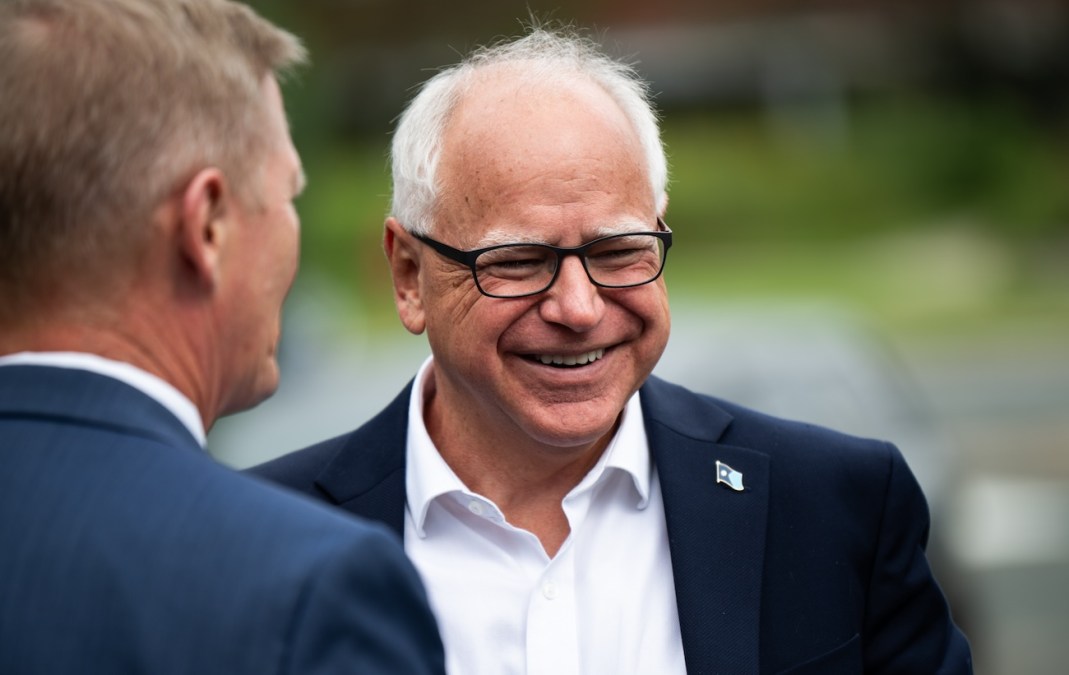Fixing state IT issues once kept Harris VP pick Minnesota Gov. Tim Walz up at night

Vice President Kamala Harris on Tuesday announced Minnesota Gov. Tim Walz as her running mate for the presidency, and in his five-plus years leading the state, the governor has demonstrated a track record of fixing state IT issues, including one that he said “keeps me up at night.”
Since becoming Minnesota’s governor in 2019, Walz has made millions in funding available for technology upgrade projects and led notable cybersecurity initiatives in his state.
Last year, the Democratic governor signed several funding bills approving $500 million in technology spending through 2025, along with $130 million for Minnesota IT Services, the state’s information technology bureau. Tarek Tomes, Minnesota’s chief information officer, told StateScoop last year the funding was part of the Walz administration’s commitment to improving residents’ experiences.
The first thing Walz set out to do to improve residents’ experience as governor was rectify the failed Minnesota Licensing and Registration System, or MNLARS, project. The homespun project designed to help administer license plates and driver’s licenses had been in the works since 2008, but after a premature launch in 2017, numerous bugs and missing features resulted in massive registration backlogs.
Walz inherited the system’s issues when he assumed office.
According to a 2019 auditor’s report, the project cost the state more than $100 million over the 10 years it was in the works. Without pointing fingers at any particular official, auditors said MNLARS far exceeded the scope and complexity of any IT project in Minnesota history. Walz told the Minneapolis Star-Tribune in 2019 the MNLARS system “keeps me up at night,” and he authorized an additional $13.3 million to continue repairing the system just a few months after taking office.
Also in 2019, Walz appointed Tomes to the CIO role to lead Minnesota IT Services. By then, the agency was associated with the repeated failures of MNLARS, and some critics called for the dissolution of the agency.
The following year, Walz — at the recommendation of a third-party review and following the release of an independent report on the project’s failings — decided to scrap MNLARS in its entirety. Instead, he announced the state was opting for “off-the-shelf” software to replace the system, which cost the state another $53 million.
“The governor really led on this issue,” then-state-Sen. Paul Gazelka said of the decision. “He was willing to take a new and fresh look at it. This is bold. It bodes well for Minnesota.”
Along with fixing broken IT systems, Walz’s approval last year of $500 million for technology initiatives is putting more Minnesota services on modern cloud platforms, creating new digital services for residents and improving the state’s cybersecurity. Tomes has said his agency will use some of the funds to build new systems at the the Minnesota Department of Human Services for paid family medical leave, and at the Department of Corrections to improve rehabilitation opportunities for folks transitioning out of incarceration.
Last September, Minnesota announced its “whole-of-state” cybersecurity plan, which will distribute $23.5 million to local governments, tribal nations and K-12 school districts to strengthen local government cybersecurity defense. The plan follows a 2019 executive order that created the state’s Blue Ribbon Council on Information Technology, which is helping to administer the funding.
Beyond the Minnesota border, Walz also has an extensive national record on cybersecurity, including authoring letters to the Biden administration about international cyber threats and the potential risks of various federal cyber regulations.
Walz this year added Minnesota to the list of 20 states that have comprehensive data privacy laws on the books. Minnesota’s privacy law will go into effect next year. Similar to the laws found in Delaware and Connecticut, Minnesota’s establishes data rights for consumers, requirements for businesses that possess large amounts of consumer data and mandates they give notice of how that data will be used.
Beyond tossing and turning at night over failed IT modernization projects, Walz is also adept at navigating social media to rally constituents, sometimes by making memes about a technology issue many faced in 2022: not getting Taylor Swift tickets.



